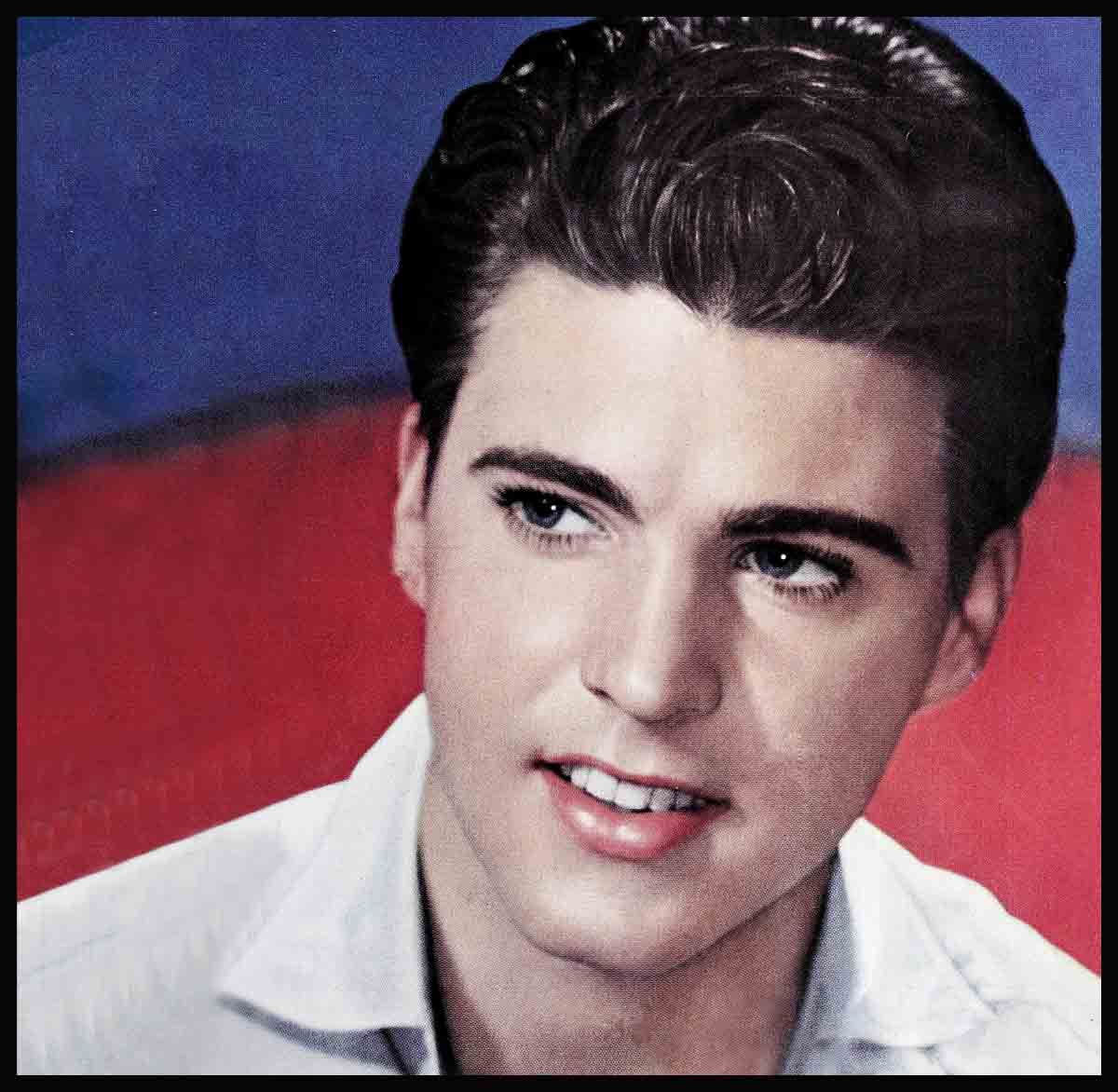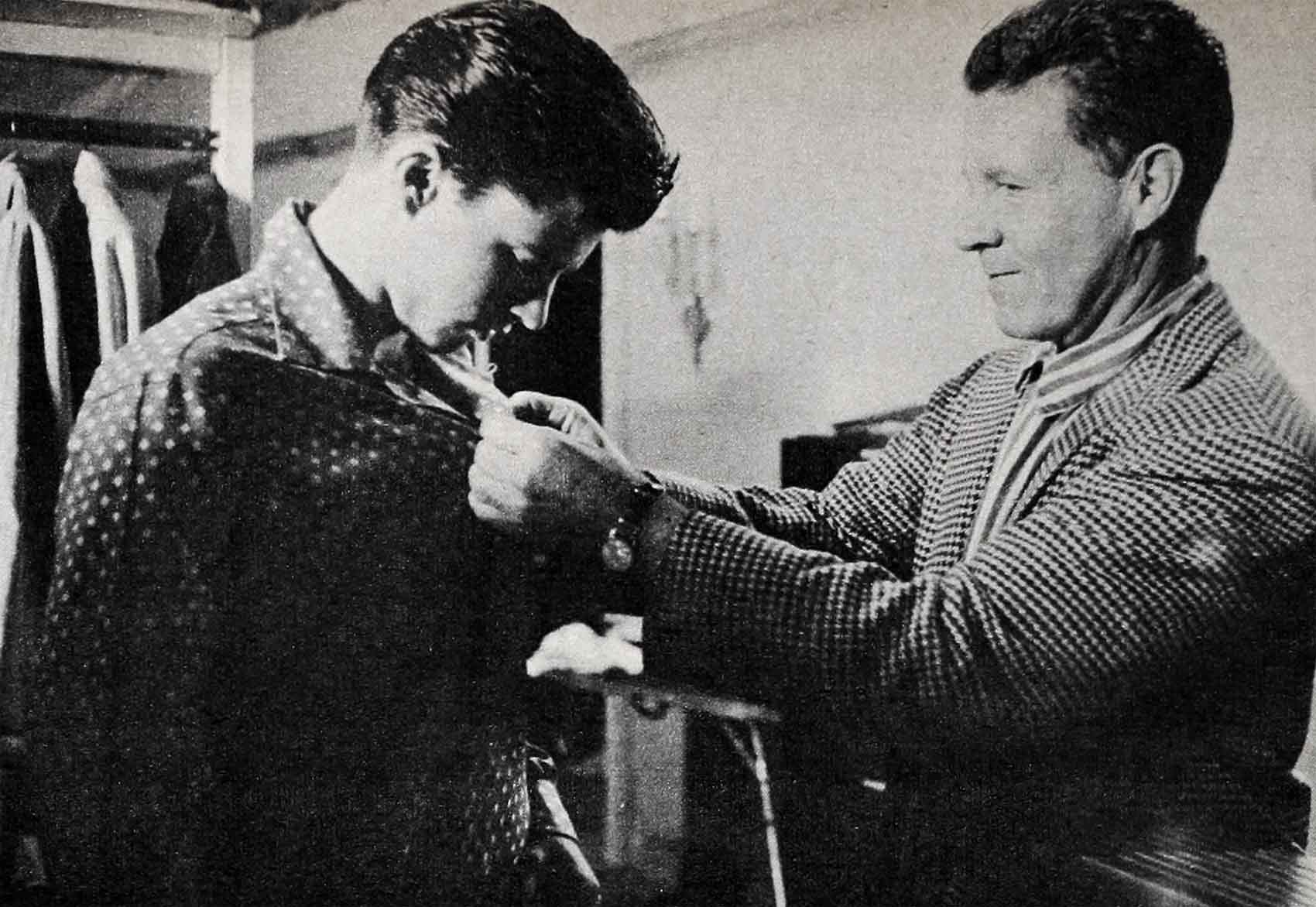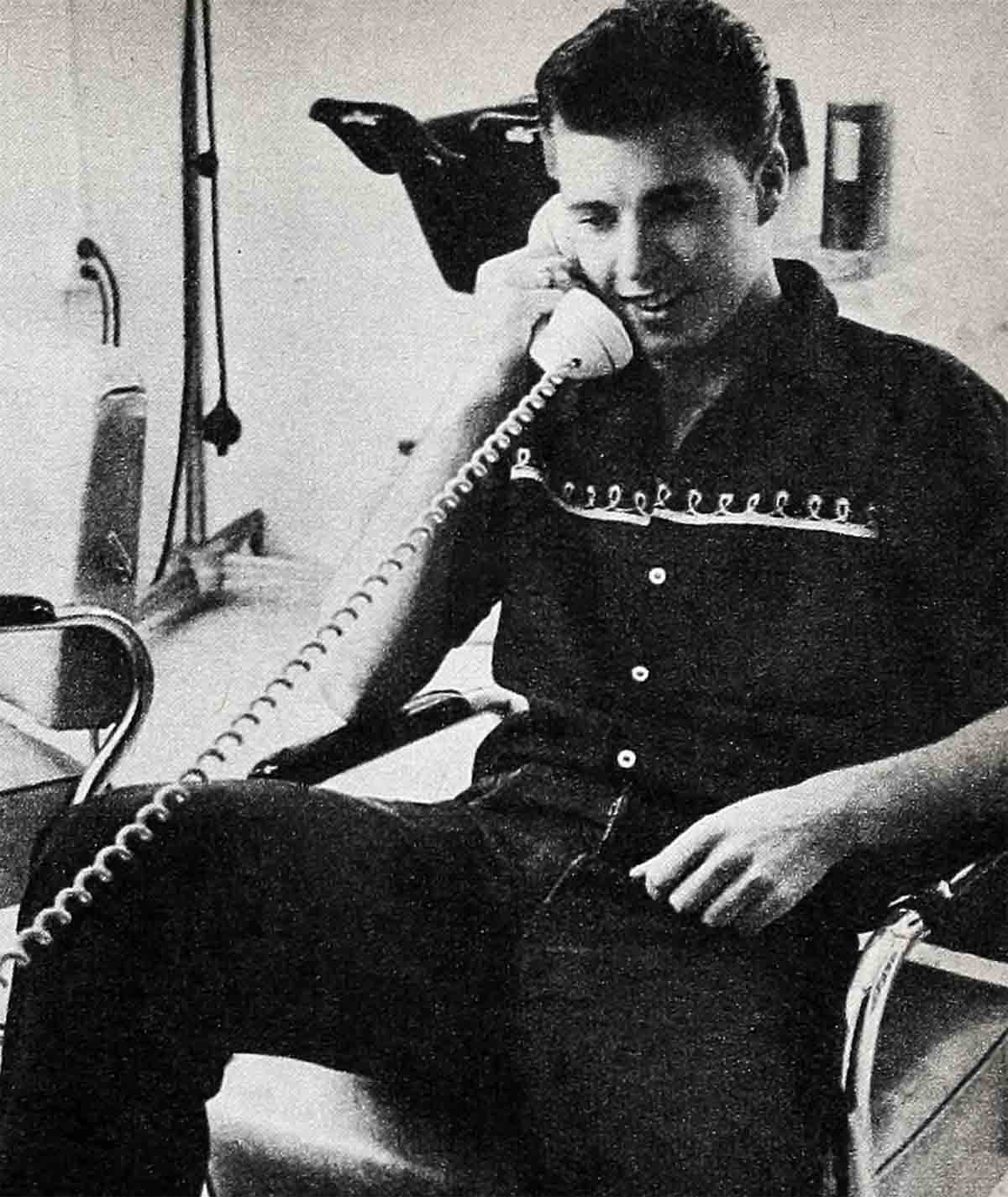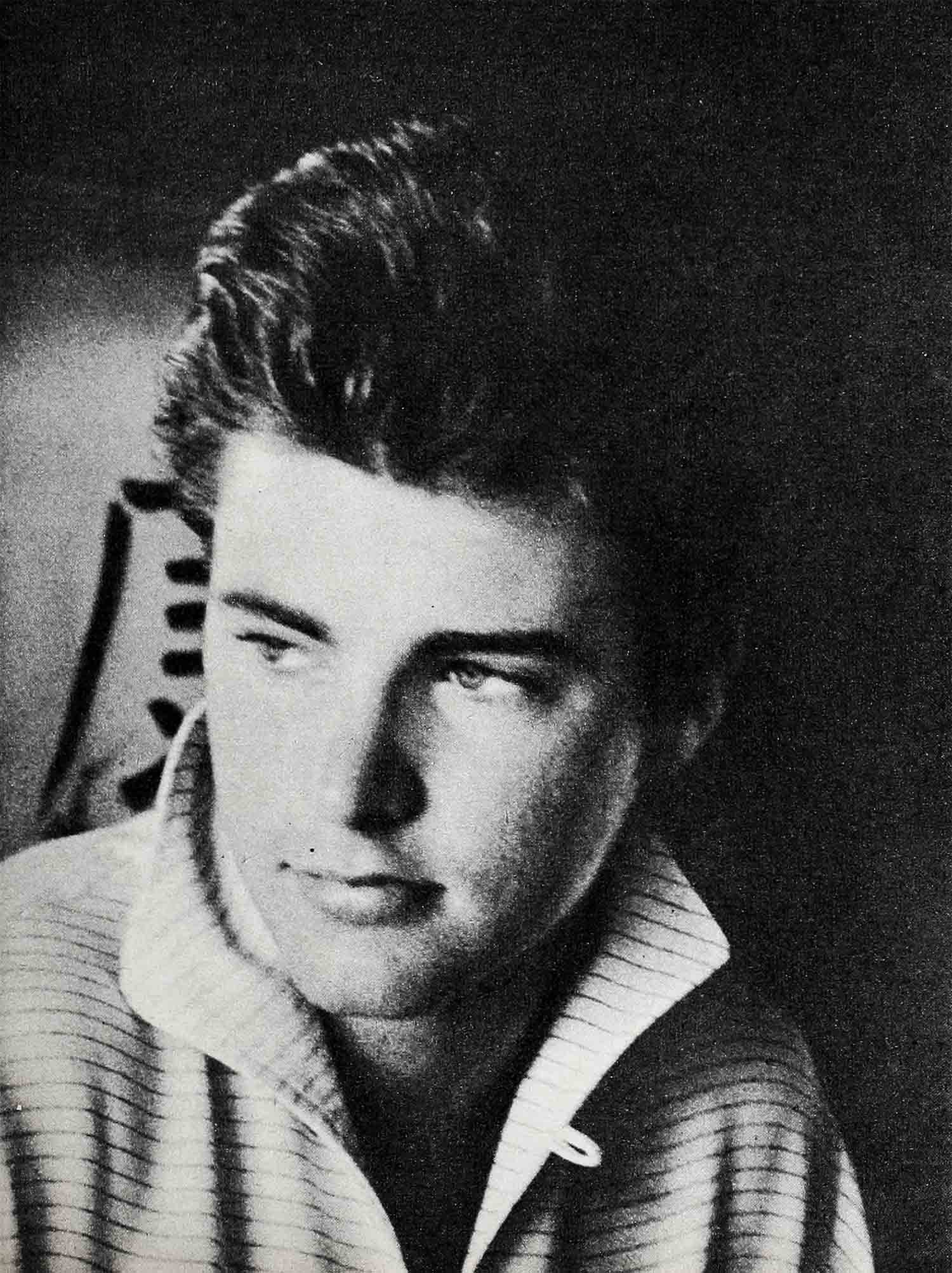
Rick Nelson: “Were You The Girl In The Gingham Dress?”
There was a knock at the door of my dressing room one night while I was on tour recently, and when I called “Come in,” the door opened very slowly and the prettiest little face with the bluest eyes I’ve ever seen peeped around. Her eyes were so wide open they looked like two round saucers, and she had beautiful long blonde hair the color of corn.
“Come along in,” I laughed. And she walked into the room followed by three other girls. I noticed that she was wearing a blue and white checked dress. My mom has one in the same material and calls it gingham.
Well, they all stayed for a while and we talked. Then, when the other girls left, she sort of stayed behind, wandering around and around the room and asking all sorts of questions.
It was in between shows, and she seemed so nice I asked her if she wanted to come over to our hotel afterwards. She looked at me in that wide-eyed way and nodded her head, yes.
“Do you know where I’m staying while I’m here?” I said.
She nodded again, jerking back a lock of blonde hair that had slipped over her cheek.
“Maybe you would like me to call your folks and ask them if it would me all right?”
She just stood there and kept nodding yes. Then just as I was going to ask the number, someone came in and told me they were waiting for me onstage.
I got up and said to her, “Don’t go away—please. Stay until I get back. It’ll only be a few minutes, and then we can phone your folks.”
She smiled and said, “Yes,” very quietly.

All the time I was onstage I kept on thinking about her, standing there in that pretty gingham dress, and afterwards I raced to the dressing room as fast as I could. It was empty. She was gone. And I realized I hadn’t even found out her name. Then I decided she must have gotten tired of waiting and she’d probably be in the hotel lobby when I got there.
When I walked into the hotel, I found that the lobby was empty except for a few elderly couples. I asked the desk clerk if there were any messages for me. He laughed and said, “Yes, about six hundred girls called and they all send their love.” I smiled weakly and went to sit in a straight-backed chair facing the front of the hotel. Everytime the revolving door spun around, I imagined my girl in gingham would be walking through—but everytime it was somebody else’s girl or guy. I waited more than an hour. She never showed up. I left a message with the desk that I would be in my room if anyone asked for me.
I went upstairs. The other boys in our group were sitting around, eating and watching TV. I called home and talked to the folks. Then I just sat. I wasn’t hungry. I wasn’t sleepy. I wasn’t much of anything. I kept wondering why, why she hadn’t come. Was she afraid? Wouldn’t her folks let her? Why hadn’t she at least left a message? And why had I been so preoccupied looking at her that I hadn’t even gotten her name? I went back down to the lobby. I sat and waited some more. About one in the morning I gave up. She obviously wasn’t going to come. I went upstairs and tried to get some sleep. I couldn’t. I got out my guitar and spent the rest of the night sitting in the corner of our suite, strumming softly, knowing I’d never see her again, because in the morning we’d be off to some other town . . . and I began thinking, thinking about other cute girls like her I’d met on tour, and how I never had a chance to get to know them. And how lonely it was, away from home, even in the midst of all the wonderful people who always welcomed me and came to hear me sing.

And as I began to think back over these past two years, I suddenly felt I wanted to tell you all what it’s really been like, traveling around the country and singing to you. It’s kind of tough trying to explain. I can tell you of some of the crazy things that have happened, but when it comes to the serious side, how can I explain the loneliness of it all, jumbled together with the wonderful feeling I get when I arrive in a strange town—a place I’ve never been to before—and find hundreds of girls waiting for me with my name sewn all over their skirts and blouses, and hear them shout my name and see them carrying a banner saying “Welcome Rick”? Or what you feel inside when a little girl in a wheelchair is pushed through a crowd and she looks up, smiles and says, “Would you sign my autograph book?” And you know how much of an effort it must have been for her to work through the crowd just to see you.
I’m not a person who shows my emotions easily, anyway not when I’m with a large group of people. I’ve been accused of being too untalkative and I guess maybe that’s partly true. But even if I don’t say too much, I do have feelings. I do care if people shout my name and I can’t shout back theirs because I don’t know it and probably won’t have an opportunity to stay in that town long enough to find out. When I get into a town I want very much to walk around, see what the city’s like, meet some of the people . . . and don’t think I don’t feel pretty silly sometimes when I find myself surrounded by two dozen policemen, sent to protect me from a crowd of girls!
But honestly, this police protection is as much for the girls as it is for me. In past tours of rock ’n’ roll singers, people have been hurt when the crowds get out of hand. So there has to be some control or everybody would wind up trampling over everybody else. And, speaking of trampling, it reminds me . . .
We’d landed at the airport of one particular town to find about three thousand people waiting for us to get off the plane. I guess the local police hadn’t expected such a mob, because the crowd wasn’t organized like it usually is, and we just couldn’t see anything but people. So you can imagine it took quite a while of saying hello and signing autograph books before I got through and to the hotel.

Well, I couldn’t have been in my room five minutes before the phone rang. I picked it up and a woman’s voice said, “Rick Nelson?”
“Yes,” I answered. It didn’t sound like a young person.
“You should be ashamed of yourself—kicking girls in the ankle.”
“Kicking girls’ ankles?” I said, surprised. I didn’t know what she was talking about.
“Yes—just half an hour ago. At the airport. In all that mob, you kicked my daughter’s ankle with one of those heavy shoes you had on, and it was bleeding so much we had to call a doctor, right there.” She sounded awful mad.
“Gee—I’m sorry,” I said, remembering the chaos there had been. “I didn’t do it purposely.”
“I should hope not.”
“Is there anything I can do, Mrs. uh . . . Mrs. . . .?
“Fenton,” she prompted.
“. . . anything at all?”
“Well, the least you might do is apologize to my daughter yourself.”
“Is she with you right now?”

“Yes, Mr. Nelson. She is.” And I heard her calling to someone.
“Hello, I’m Sally,” said a thin, high-pitched young voice.
“Hi! I’m Rick. I’m awful sorry about your ankle. I didn’t realize I’d put on my heavy . . .” And just as I was about to say the word “shoes” I looked down and to my amazement found I had on my soft-sole tennis sneakers! I just didn’t know what to say. But I had to finish my sentence. “Let me know how it is,” I said finally, feeling completely baffled.
I just couldn’t understand how I could have hurt her so much, and she must have called me back about six times to report on the progress of her foot.
She sounded kind of cute, and a few times I wanted to say, “Sal, why don’t you come down and see the show?” But it didn’t seem right to say that to someone who’d told you she was hurt so bad she could hardly walk (even though I was pretty certain she wasn’t).
Then, the day we left town, a pretty girl with a little button nose and deep brown hair tied back in a ponytail, came running toward me across the airport. When she caught up with me she was all out of breath.
“Hey—not so fast,” I joked. “Take it easy.” She was pushing her way quite determinedly through the crowd.
“I just had to say goodbye to you, Ricky,” she panted. “And thank you for being so concerned about my foot.” Then she smiled shyly and ran (limp-lessly!) away before I could say anything, dashing along like some high-school track star, her coat flapping as she went.
I tried to shout out, “Come back. I’m not mad. You should have said you wanted to meet me.” But she disappeared too fast, and at that moment I was rushed away to catch my plane.

I thought about her for quite a while after that. She’d reminded me so much of another girl, that girl in gingham.
But talking of phones, it seems people always find out where I’m staying even before I get to a town, and the board at the hotel is flooded with calls for me. The rest of the hotel guests are upset because nobody can get a line out to call. But I must admit the operators take the whole thing good-naturedly.
One time, one of them told me, “The girls calling you use every trick in the book. Why one girl cried when I told her I couldn’t put her through. She screamed that she was your cousin and that you were expecting her to call. I finally told her if she was a relative of yours, then the best thing would be to come directly over to the hotel and go right up to your room. That I’m sure you would be only too happy to see her. I thought that might clear my line.”
She laughed and went on, “But five minutes later the girl called back and used a deeper voice—this time saying she was your aunt!
“But the teenager who called you this morning really took the cake. Why, that one called six times and I bet you can’t guess what she tried to pull!”
I shook my head.
“Well this one got on and said, ‘This is long distance. I have a call from Hollywood for Mr. Rick Nelson from his mother. Would you put Mr. Nelson on, please.’ Then there was a pause and she came back on again using a different voice and said, ‘Rick? Rick?’ I just said, ‘Listen, young lady, I’ve been a switchboard operator for ten years and I know all about those phony long-distance calls. Now please hang up.’ But she kept calling back, saying she was your mother. Then she put some boy on the phone, and he said, “This is Ozzie Nelson, I’d like to talk to my son, please. Imagine thinking I’d fall for something like that!”

I didn’t have an answer for her because the manager came up to me with an urgent telegram.
I tore it open and it said, “Rick. Please call us immediately. The operator won’t believe we’re your parents. We’ve been trying to get through all morning. Love, Mom.”
But it’s not only the phones we have trouble with on tours—it’s meals as well. Now I’m the sort who can eat almost anything, anywhere, at any time. But when I get hungry, I sure get hungry. So you can just imagine how I felt when one time it was a case of missing the train if I stopped to grab some food. But I figured there would be a dining car on the train, so it wasn’t too serious . . . until I found out there wasn’t one!
We were really late that time and zoomed into the station just as the train was starting up and jumped on the nearest car without noticing it didn’t have any windows. We started walking through and couldn’t see anything but sacks of mail, boxes and crates. So we just kept walking, hoping to find some signs of civilization (and food) sooner or later. We passed through two cars, then stopped dead in our tracks. On the floor were half a dozen long, thin, wooden boxes—coffins! Nobody said a word. It sure was eerie. Finally we found the one and only pullman car on the train. We unloaded our junk and then continued the quest for food. We kept walking and walking until finally we met the conductor.
“Pardon me, sir,” I said. “Could you please tell us how to get to the dining car?”

“Well, now, son, that would be mighty difficult, seeing as how this here train don’t have no such thing as a dining car,” he chuckled. We all laughed politely—hungry or not we couldn’t let him see we didn’t think what he said was funny.
“But don’t let that worry you all none,” he went on. “Why at our next stop there’s a little cafe that serves the best five cent cup of coffee in the country. And they have roast-beef sandwiches that are a whole meal by themselves. It’s only a ten minute stop, but I’ll have the porter get off and get what you want.”
We ordered nine roast beefs, six Cokes, some milk and candy bars.
“Excuse me,” I said, “but just how long is it until we get to that stop?”
“Well, let’s see,” he said, taking a big gold watch out of his pocket. “It’s now 11:32. Train’s due in there at 4:30—if we’re on time.”
“Four-thirty tomorrow morning!”
“Yep,” he grinned.
We headed back to the pullman car. Five hours until mealtime. I climbed into the upper berth intending to keep myself awake by practicing my guitar. But when one of the guys handed it up to me, there was no room to move my arms. So I gave up that idea. But I was too hungry to sleep and decided to pull up the window shade and watch the towns go by. And I just sat there, making up crazy names for the places we passed. Then I got tired of that and concentrated on looking out at the tiny farms, wondering what sort of people lived in the houses and why so many stories were told about farmers’ daughters. Then, somehow, all my thoughts kept turning into the image of a big roast-beef sandwich, mixed up with a picture of that blue-eyed girl in the checked dress, offering it to me, begging me to eat. . . .
“Better get up, we’ll be there in ten minutes.” I felt someone shaking me. I turned over, mumbled something about not wanting any old beef sandwich, and went back to sleep.
“No, sir,” the porter said, shaking me again. “It’s not ten minutes to the sandwiches, it’s ten minutes ’til your station!” I opened one eye and looked out. The sun was streaming in. I must have fallen sound asleep!
“I sure want to thank you for the dinner,” the porter was saying.
“You’re welcome,” I muttered. “Dinner? What dinner?” Suddenly I realized what he was saying.
“Why me and the conductor just couldn’t let all nine roast beefs go to waste; so we divided them between us and ate them. We tried to get you up, but you were beyond wakin’.”
I threw on my clothes. I was in Minnesota! We were scheduled to play three shows at the twin cities (St. Paul-Minneapolis). I grabbed for my electric razor and gave myself a quick shave. And was I hungry!
I guess I’ve made these stories sound like pretty good fun. Touring is, at times, although, as I said, it can get mighty lonely. And so it would be great to have a girl to date in each town I go to, not any big romance or anything like that, just a nice girl to go to a show with, to take a drive with, or to talk to. Someone to tell me, “Gee, the show was good, Rick.” It would mean so much. So many times I’ve seen girls, like the one in gingham, that I would have loved to really meet and say just a little more than “hello” to—but we’ve always been separated, either I’ve moved onto another town or they’ve gotten swallowed in the crowd, or else they feel shy and disappear before I can do or say anything.
THE END
—BY RICK NELSON as told to MARCIA BORIE
BESIDES HIS RECORD HITS FOR IMPERIAL AND HIS PARTICIPATION ON “THE ADVENTURES OF OZZIE AND HARRIET” (ABC-TV, WED., 8:30-9 P.M. EDT), RICK WOWS ’EM IN WARNERS’ “RIO BRAVO.”
It is a quote. PHOTOPLAY MAGAZINE JUNE 1959




